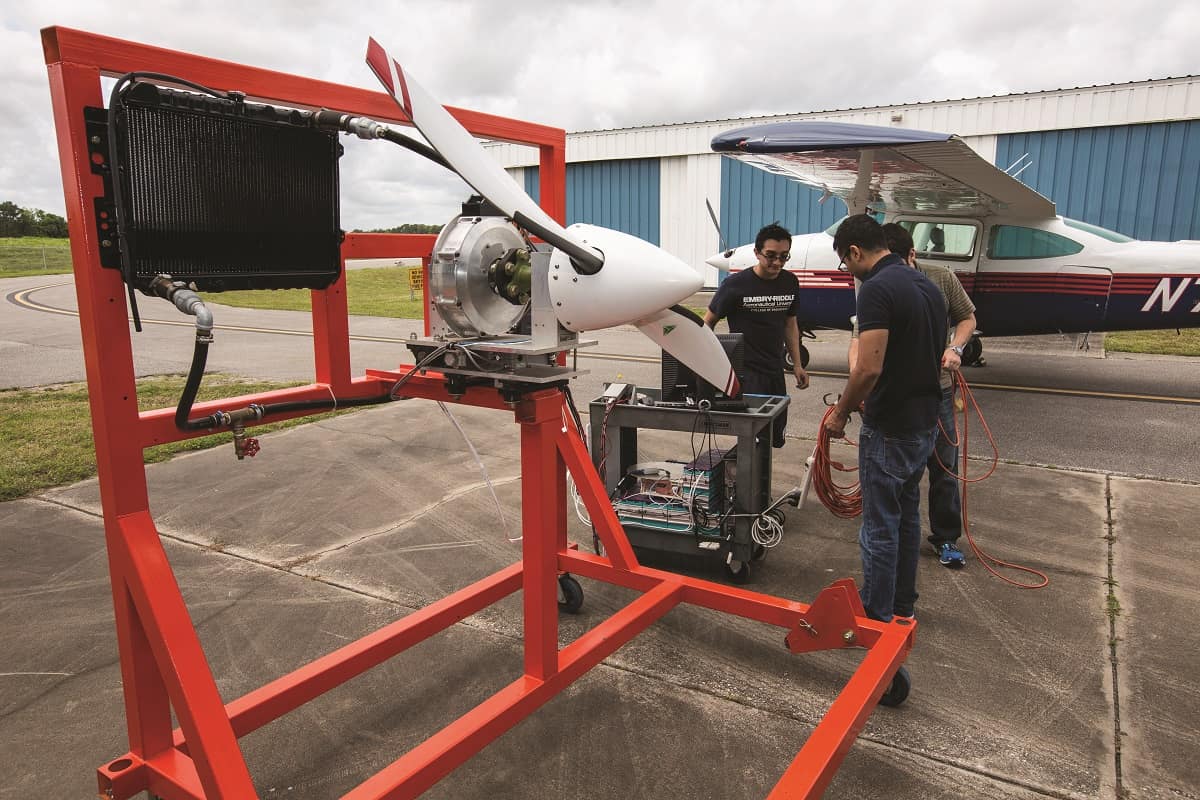Aviation Industry Leaders Join Embry-Riddle to Research, Design Hybrid-Electric Aircraft

Academic and Manufacturing Consortium Aims to Provide Alternative Propulsion Options for Commercial Airlines
Seizing on a global push for more cost-efficient, environmentally responsible and innovative transportation solutions, international aircraft manufacturing leaders such as Boeing, Airbus, General Electric Aviation (GE) and others have teamed with globally renowned aerospace, aviation and research institute Embry-Riddle Aeronautical University to provide expertise, research and funding to design the world’s first hybrid-electric turboprop aircraft.
Led by the university’s Eagle Flight Research Center (EFRC) based at its Daytona Beach, Fla., Campus, and in collaboration with Argonne National Laboratory, the Embry-Riddle Hybrid Consortium is working with contributing members such as Airbus, Boeing, GE Aviation, Textron, Rolls-Royce, Hartzell, Cape Air and more to explore the design space for turbine/electric aircraft propulsion systems that reduce noise, emissions and operating costs. The ultimate goal is to produce a commercially viable, nine-passenger hybrid turboprop by 2025, and a large hybrid-electric jet by 2035.
Research culled from Embry-Riddle’s EFRC in designing a clean-sheet, integrated hybrid turboprop in the 600 horsepower class (400/200) as well as multiple patents and successful hybrid and electric aircraft projects will be leveraged and shared with the consortium as it examines classic aerodynamics and new, alternative propulsion systems. To date, EFRC research has include unleaded replacements for 100LL, hybrid gas/electric propulsion, full electric propulsion, electric aircraft systems and hybrid road vehicles.
“The confluence of modern controls, batteries and the overhaul of the regulatory landscape make this the right time to design the air vehicles of the future,” said EFRC Director and Professor of Aerospace Engineering, Dr. Richard “Pat” Anderson, who is the founder and lead for the consortium. “When the consortium is fully funded we will be able to leverage existing Embry-Riddle and partner research coupled with extensive knowledge to successfully change the future of hybrid aviation.”
The three-phase, multi-year project aims to produce a test article in the form of a prototype 600 SHP turboprop engine. Utilizing battery packs as the power source, the integrated design will address weight concerns and technology needs. Having completed Phase I (performing conceptual design of clean-sheet hybrid turboprop airframes and propulsion systems), the consortium is now in Phase II, which includes designing the motor, battery packs and battery management systems. The third and final stage is completing a detailed design of the prototype engine and associate systems and increasing the ground test facility capabilities as well as manufacturing and testing the prototype motor.
“Forward-thinking research, collaborative knowledge sharing and ultimately, successful implementation of needed solutions for the transportation industry as a whole is at the core of this consortium,” said Embry-Riddle President Dr. P. Barry Butler. “There is a shared commitment by consortium partners and the university to be the provider of efficient, cost-saving, innovative propulsion alternatives for aircraft and beyond.”
The initial seed money for the research consortium has been provided by the university and the partner companies, and federal funding and additional collaborators are actively being sought for advanced research and support.
“Airplanes have looked fundamentally the same for the past 115 years. The confluence of new technologies, research and regulatory advancements is going to change what future airplanes will look like,” Anderson said. “This consortium is a catalyst to move the aviation – and the entire transportation – industry from the old paradigm into a new and excitingly different design space.”
About Eagle Flight Research Center
The Embry-Riddle Eagle Flight Research Center (EFRC) serves as Embry-Riddle Aeronautical University’s Aerospace R&D facility. The state-of-the-art center is equipped to conduct a variety of projects, including: Experimental flight testing, aircraft modifications for FAA certification, design and testing of unmanned aerial systems (UAS), development and verification of high-fidelity (up to Level D) flight-data models used in engineering and training simulators and prototype engineering solutions to advance eco-friendly alternatives in aviation. Affiliated with the College of Engineering's Department of Aerospace Engineering, it supports the classes and individual projects and research of the university’s various undergraduate, graduate, and doctoral engineering students. The students’ research and practical efforts are supported by a diverse and experienced faculty, with specialties in fixed- and rotary-wing flight dynamics and control, flight testing, aeroelasticity, electrical engineering, air-breathing propulsion, parameter identification, and aerodynamics. In addition, the EFRC conducts research with commercial customers including aviation industry, government and military. For more information, go to Eagle Flight Research Center at erau.edu.
